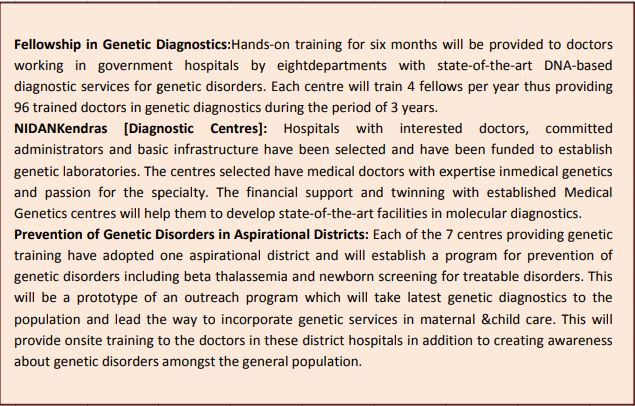‘UMMID’ Initiative | 24 Sep 2019
Recently, the Government of India has launched UMMID (Unique Methods of Management and Treatment of Inherited Disorders) initiative to tackle inherited genetic diseases of newborn babies.
- The programme will be implemented through government hospitals to regularise the use of cutting edge scientific technology and molecular medicine to achieve Universal Health Coverage for all.
- The initiative is designed on the concept of ‘Prevention is better than Cure’.
- In India’s urban areas, congenital malformations and genetic disorders are the third most common cause of mortality after prematurity & low birth weight issues and infections in newborns.
- A very large population and high birth rate, and consanguineous marriage favoured in many communities are some of the important reasons for the high prevalence of genetic disorders in India.
- The UMMID initiative aims:
- To establish NIDAN (National Inherited Diseases Administration) Kendras to provide counselling, prenatal testing and diagnosis, management, and multidisciplinary care in Government Hospitals wherein the influx of patients is more.
- To produce skilled clinicians in Human Genetics,
- To undertake screening of pregnant women and newborn babies for inherited genetic diseases in hospitals at aspirational districts.
- To create awareness about genetic disorders amongst clinicians and to establish molecular diagnostics in hospitals.
The three components of UMMID Initiative
- UMMID initiative shall work to shift focus from “sick-care” to “wellness” by promoting the prevention of genetic diseases.
Inherited Genetic Diseases
- A genetic disorder is a disease caused in whole or in part by a change in the DNA sequence away from the normal sequence.
- Genetic disorders can be caused by a mutation in one gene (monogenic disorder), by mutations in multiple genes (multifactorial inheritance disorder), by a combination of gene mutations or by damage to chromosomes.
- Some of the examples of Genetic disorders are: Sickle Cell Anemia, Heart Disease, High Blood Pressure, Alzheimer's Disease, Diabetes, Cancer, and Obesity.

